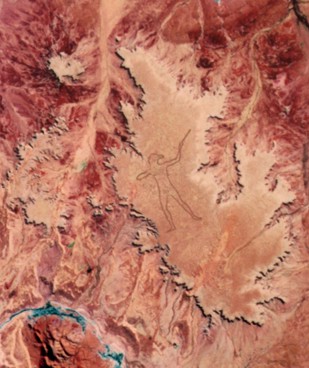 |
| The Marree Man from above |
Geoglyphs are works of art
that are made either by making mounds out of material like rocks or soil or by
digging lines or shapes into the soil. Most geoglyphs are impossible to see as
art at ground level. However, if you view them from a plane, their shapes
become clear. Some examples of geoglyphs are the Nazca lines in Peru and the
Serpent Mound in Ohio, U.S.A. These are examples of rather large and well-known
geoglyphs that have been around since long before our time. We also have a
relatively good idea of who made them. Oddly, the largest geoglyph in the world
is only a few decades old and nobody seems to know who made it. This geoglyph
is called the Marree Man and it is located in the outback in southern
Australia.
A pilot that was flying over the
plateau on which the geoglyph is located discovered the Marree Man in July of
1998. The tremendous work of art was largely ignored, however until a local
hotel owner received an anonymous fax regarding the Marree Man. The hotel owner
told the local newspaper about it and the story ran on July 15, 1998. It was
then the public realized there is a giant, mysterious geoglyph less than three
miles outside of Marree.
The Marree Man depicts a
standing aboriginal hunter with a spear or possibly a boomerang in his hand.
The nude man is roughly two and a half miles tall. Some experts believe that it
is remarkably accurate in its depiction of an aboriginal hunter. However,
others say that it is incorrect. Either way, it is a very astonishing work of
art. Experts believe that it was completed shortly before it was discovered;
yet nobody noticed that it was being made. In fact, no one has ever come
forward and admitted to making it. This is very surprising because whoever did
it did not commit a crime.
Despite the fact that no one has
come forward to explain the Marree Man to the world, experts have a good idea
of how it was made. The outline of the geoglyph was made by removing the
vegetation from the soil where the lines were. There was also a layer of soil
removed to reveal the lighter soil beneath, thus making the Marree Man stand
out against its surroundings. It is thought that the work was accomplished by
using tractors or plows to move the materials, judging by tread marks left at
the scene. It is also thought that the artist or artists used GPS to map out
their design and make it as accurate as it is.
Today, the Marree Man is slowly
fading, but it is still clearly visible from a plane. However, it will
eventually erode away. For now, there is no way of knowing why it was even put
there to begin with. Indeed, it may never be known who made the Marree Man or
why they did it.
Update: As of fall 2016, the Marree Man is much clearer due to
restorations conducted in collaboration with the aboriginals in the area. There
is hope that the new grooves will fill with water and turn the dusty old Marree
Man green!
Sources
Marree Man, retrieved 9/23/09
Giant Marree Man in SA makes acomeback, retrieved 9/12/16
No comments:
Post a Comment